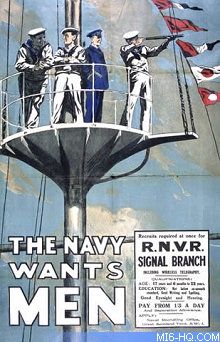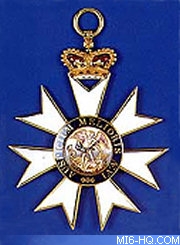|
|
|
 |
| |
MI6 looks back at James Bond's obituary published
in The Times during Ian Fleming's novel "You
Only Live Twice"
|
|
James Bond's Obituary
8th July 2005
In the world of secret agents and espionage, death is a very
real element. This same truth applies to James Bond’s universe.
Throughout the films, we see Bond as directly and indirectly responsible
for the deaths of villains and henchmen of all shapes and sizes.
Along the way, many of Bond’s closest allies have lost their
lives, as well: Quarrel in Dr. No, Kerim Bey in From Russia With
Love – the list is seemingly endless. Even Bond’s
wife, Tracy, was killed by his nemesis, Blofeld, in On Her Majesty’s
Secret Service.
But what would happen if James Bond, himself, were to die? While
Bond has gotten in and out of some sticky situations throughout
the films, the character Ian Fleming wrote about in his novels
and short stories had many more “close calls”. In
many of the books, we see Bond being tortured till he is on the
verge of dying, and then somehow finding the will to survive.
At one point, Fleming grew tired of the character, and intended
to have James Bond murdered at the end of the novel, From
Russia With Love. Somehow, though, Fleming was persuaded to
“resurrect” his creation, and continue the series
with Dr. No.

Above: Recruitment poster (National
Archives). |
|
In the film You
Only Live Twice, we see James Bond’s funeral,
albeit fake. But in the novel by the same title, we actually
get to read James Bond’s obituary, written by his
boss, M. (Ironically, James Bond’s obituary appears
in the last Bond novel Fleming completed. Ian Fleming would
die before finishing the manuscript for The Man with the
Golden Gun.) What makes Bond’s obituary important,
though, is that it is the first time Fleming really gives
much background info on who James Bond really is and where
he came from.
Much can be learned about James Bond just from the way
he is addressed at the beginning of the obituary: “Commander
James Bond, C.M.G., R.N.V.R.” Both “Commander”
and “R.N.V.R.” refer to Bond’s military
service. The R.N.V.R. (or Royal Navy Volunteer Reserve)
was founded in 1903 in response to the threat of Germany’s
growing navy. Members of the R.N.V.R. served not only at
sea, but also on land and in the air, with some 70,000 members
serving in World War I, and as many as half a million reservists
serving in World War II. The R.N.V.R. was dissolved in 1958,
and would-be members are now a part of the Royal Naval Reserve
(R.N.R.). James Bond entered the R.N.V.R. during WWII at
the rank of Lieutenant, and by the end of the war, he had
attained the rank of Commander.
|
The letters “C.M.G.” refer back to the novel,
From Russia With Love, in which we read that James Bond was made
a Companion in the Order of St. Michael and St. George in 1954.
This order today is given to those who either a) have held or
will hold a high office, or who b) have performed – as in
James Bond’s case – an extraordinary or important
non-military service in a foreign country. Members of the Order
receive a badge such as the one pictured here. The motto is AUSPICIUM
MELIORIS AEVI ('Token of a better age'). The front of the badge
shows St. Michael subduing Satan, and the reverse of the badge
shows St. George and killing a dragon. A Companion of the Order
– such as James Bond – would wear the badge suspended
from a ribbon around the neck on formal occasions.
Unlike the film, in which James Bond’s death was faked
on purpose by MI6, in the You Only Live Twice novel, M writes
Bond’s obituary when Bond is missing, presumed dead, at
the end of a mission. After a short introduction, M begins to
give us a brief biography of James Bond.
|
According to M, James Bond’s father was a Andrew
Bond, of Glencoe, Scotland, and his mother was Monique Delacroix,
from the Canton de Vaud, in southwestern Switzerland. Andrew
Bond was a foreign representative of the Vickers armament
firm, and James traveled with his parents wherever the work
took them. When James was eleven years old, both of his
parents were killed in a climbing accident in the Aiguilles
Rouges, in eastern France.
Because of his parents’ traveling, James Bond’s
early education was entirely abroad, and he became fluent
in both French and German. After his parents’ death,
young James went to live with his aunt, Miss Charmian Bond
in Pett Bottom, a hamlet near Canterbury. Then at the age
of twelve, James entered at Eton College, but after a year,
M writes, there was “some alleged trouble with one
of the boys’ maids”, and James transferred to
Fettes, where he took part in wrestling, founded a judo
class, and graduated early at the age of seventeen.
|
|

Above: The CMG |
Now according to the obituary, upon his graduation from Fettes
(still at age seventeen), one of James Bond’s father’s
colleagues helped him to enter the Special Branch of the R.N.V.R.
by claiming that Bond was actually nineteen years old. There is
some confusion here, however, because M claims that this happened
in 1941, but in From Russia With Love, we read that James Bond
began his service in 1938 (even though Bond was only fourteen
in 1938, according to M).
 |
|
At the end of WWII, James Bond began working for MI6.
Of course M couldn’t mention the nature of Bond’s
missions in such a public forum as an obituary in a newspaper,
but he does speak highly of Bond’s work, going so
far as to claim that Bond possessed “The Nelson Touch”
(the ability the command loyalty and draw out the skills
and abilities of those around him) in emergency situations.
In a brief humorous moment, M mentions the novels made
about James Bond, explaining that Bond’s missions
had gained some publicity in foreign press, and that “If
the quality of these books, or the degree of their veracity,
had been any higher, the author would certainly have been
prosecuted under the Official Secrets Act.” M goes
on to refer to the Bond novels as “fictions”
and “highly romanticized caricatures” of Bond’s
career.
Wrapping up, M refers back to the events of On Her Majesty’s
Secret Service, mentioning Bond’s brief marriage to
Teresa Di Vicenzo in 1962, and the fact that Bond had no
other living relatives.
|
The very end of the obituary was written by someone denoted
merely as “M.G.”, who claims to have served under
Bond for three years at the Ministry of Defence (this is Mary
Goodnight, who was secretary to the 00 section in some of the
novels). M.G. suggests that if indeed James Bond is dead, these
words would summarize Bond’s philosophy of life, and would
be fitting for his epitaph: "I shall not waste my days in
trying to prolong them. I shall use my time."
| |
The
Times
Commander James Bond, C.M.G., R.N.V.R.
M. writes:--
As your readers
will have learned from earlier issues, a senior officer
of the Ministry of Defence, Commander James Bond, C.M.G.,
R.N.V.R., is missing, believed killed, while on an official
mission to Japan. It grieves me to have to report that hopes
of his survival must now be abandoned. It therefore falls
to my lot, as the Head of the Department he served so well,
to give some account of this officer and of his outstanding
services to his country.
James Bond was
born of a Scottish father, Andrew Bond of Glencoe, and a
Swiss mother, Monique Delacroix, from the Canton de Vaud.
His father being a foreign representative of the Vickers
armaments firm, his early education, from which he inherited
a first-class command of French and German, was entirely
abroad. When he was eleven years of age, both his parents
were killed in a climbing accident in the Aiguilles Rouges
above Chamonix, and the youth came under the guardianship
of an aunt, since deceased, Miss Charmian Bond, and went
to live with her at the quaintly-named hamlet of Pett Bottom
near Canterbury in Kent. There, in a small cottage hard
by the attractive Duck Inn, his aunt, who must have been
a most erudite and accomplished lady, completed his education
for an English public school, and, at the age of twelve
or thereabouts, he passed satisfactorily into Eton, for
which College he had been entered at his birth by his father.
It must be admitted that his career at Eton was brief and
undistinguished and, after only two halves, as a result,
it pains me to record, of some alleged trouble with one
of the boys' maids, his aunt was requested to remove him.
She managed to obtain his transfer to Fettes, his father's
old school. Here the atmosphere was somewhat Calvinistic,
and both academic and athletic standards were rigourous.
Nevertheless, though inclined to be solitary by nature,
he established some firm friendships among the traditionally
famous athletic circles at the school. By the time he left,
at the early age of seventeen, he had twice fought for the
school as a light-weight and had, in addition, founded the
first serious judo class at a British public school. By
now it was 1941 and, by claiming an age of nineteen and
with the help of an old Vickers colleague of his father,
he entered a branch of what was subsequently to become the
Ministry of Defence. To serve the confidential nature of
his duties, he was accorded the rank of lieutenant in the
Special Branch of the R.N.V.R., and it is a measure of the
satisfaction his services gave to his superiors that he
ended the war with the rank of Commander. It was about this
time that the writer became associated with certain aspects
of the Ministry's work, and it was with much gratification
that I accepted Commander Bond's post-war application to
continue working for the Ministry in which, at the time
of his lamented disappearance, he had risen to the rank
of Principal Officer in the Civil Service.
The nature of
Commander Bond's duties with the Ministry, which were, incidentally,
recognized by the appointment of C.M.G. in 1954, must remain
confidential, nay secret, but his colleagues at the Ministry
will allow that he performed them with outstanding bravery
and distinction, although occasionally, through an impetuous
strain in his nature, with a streak of the foolhardy that
brought him in conflict with higher authority. But he possessed
what almost amounted to "The Nelson Touch" in
moments of the highest emergency, and he somehow contrived
to escape more or less unscathed from the many adventurous
paths down which his duties led him. The inevitable publicity,
particularly in the foreign press, accorded some of these
adventures, made him, much against his will, something of
a public figure, with the inevitable result that a series
of popular books came to be written around him by a personal
friend and former colleague of James Bond. If the quality
of these books, or their degree of veracity, had been any
higher, the author would certainly have been prosecuted
under the Official Secrets Act. It is a measure of the disdain
in which these fictions are held at the Ministry, that action
has not yet -- I emphasize the qualification -- been taken
against the author and publisher of these high-flown and
romanticized caricatures of episodes in the career of a
outstanding public servant.
It only remains
to conclude this brief in memoriam by assuring his friends
that Commander Bond's last mission was one of supreme importance
to the State. Although it now appears that, alas, he will
not return from it, I have the authority of the highest
quarters in the land to confirm that the mission proved
to be one hundred per cent successful. It is no exaggeration
to pronounce unequivocally that, through the recent valorous
efforts of this one man, the Safety of the Realm has received
mighty reassurance.
James Bond was
briefly married in 1962, to Teresa, only daughter of Marc-Ange
Draco, of Marseilles. The marriage ended in tragic circumstances
that were reported in the press at the time. There was no
issue of the marriage and James Bond leaves, so far as I
am aware, no relative living.
M.G. writes:
I was happy and proud to serve Commander Bond in a close
capacity during the past three years at the Ministry of
Defence. If our fears for him are justified, may I suggest
these simple words for his epitaph? Many of the junior staff
here feel they represent his philosophy:
"I shall
not waste my days in trying to prolong them. I shall use
my time."
|
|
|
|
|